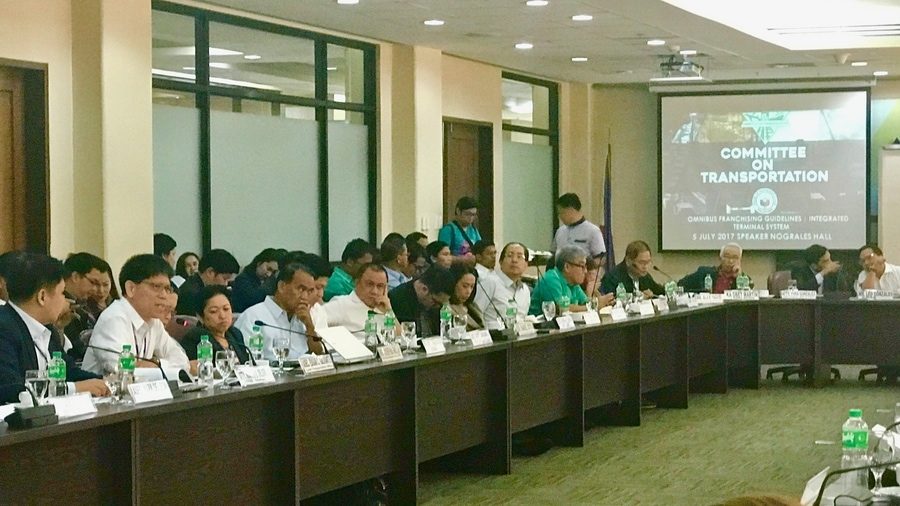SUMMARY
This is AI generated summarization, which may have errors. For context, always refer to the full article.

MANILA, Philippines – Is the Land Transportation Franchising and Regulatory Board (LTFRB) rushing the Public Utility Vehicle (PUV) modernization program?
The House of Representatives committee on transportation held this sentiment during an interpellation of LTFRB chairman Martin Delgra on Thursday, July 6.
Delgra was presenting the Omnibus Franchising Guidelines (OFG) and the Joint Memorandum Circular (JMC) 1, 2017 of the Department of Transportation (DOTr) with the Department of the Interior and Local Government (DILG) as part of the PUV modernization program.
Under the OFG, the DOTr ordered franchise operators to join together to form corporations and cooperatives as there are hundreds of operators, making regulation difficult for the small office of the LTFRB. With the help of local government units, the LTFRB can identify which corporations and cooperatives should be recognized.
The JMC 1 document was made In line with the PUV modernization as well, ordering the LGUs to modernize their transport plan by preparing local public transport route plans (LPTRPs) for the LTFRB to check.
These tasks were questioned by the House panel. In the interpellation, Delgra admitted the LTFRB only had “less than 10 people” to coordinate with the LGUs.
House transport committee chairman Cesar Sarmiento also expressed concern because the LTFRB submitted their proposed manual for LGUs on July 4 – just two days before the hearing.
Consultations rushed
With Delgra’s admission that they are undermanned, concerns of rushed work were also raised after Puersa ng Bayaning Atleta (PBA) Representative Mark Sambar of the House transport committee asked stakeholders present whether they were sufficiently consulted. Most replied they still had concerns that remained unanswered.
Alex Yague, a representative for the bus sector who said he attended a consultation, said he felt the meeting was more of a presentation where they were not given a copy of the draft of the OFG.
Sambar said he feared a repeat of the Anti-Distracted Driving Act implementation. In that situation, the DOTr failed to conduct an information campaign extensively to stakeholders, leading to the temporary suspension of the Anti-Distracted Driving Act.
“Let us not go back to the Anti-Distracted Driving [Act] na minadali natin yung IRR tapos maraming hindi natuwa dahil ang dami palang hindi naintindihan ng tao. Let’s take it step by step,” Sambar said.
Delgra admitted that they had not consulted intensively with all stakeholders, but only because not all needed extensive consultations.
“Matagal kasi kung tatapusin mo lahat that’s why we put in place yung mga components na kailangan natin ipatakbo if you look at the timeframe yung mga LGUs na [ang magcoconsult],” Delgra said. (It would take too long if we finish with all of them, that’s why we put in place the needed components needed for it to run, where LGUs will continue the consultation.)
He said that the JMC 1 is only one of 17, and they will add more guidelines for LGUs to follow in consultation with transportation agencies and stakeholders.
Capacity-building possible?
Under the OFG, the LTFRB is also designated to be the primary agency to train and advise LGUs in crafting their transport policies.
With less than 10 people in the LTFRB for consolidating the local transport plans that LGUs will prepare, the House transport committee doubted how they will be capable of handling at least 1,400 LGUs nationwide.
“[You] can always ask the Congress for additional budget,” said Sambar.
“As the member of the committee on appropriations, we would welcome your proposal for the budget to create more positions in your agency in order to have this kind of support system. But if you don’t have that program, you don’t have that plan, why are we trying to implement this?” said Sambar.
Delgra said many LGUs are already have the capacity to begin as they have their own planning and development offices present even before the OFG. He added they could not wait for all of LGUs to have that capacity as it would drag the whole program down.
Despite the criticism, Delgra assured the House panel he would consider their input in the following JMCs they will issue. He also said the the LTFRB will consult more extensively with stakeholders.
The OFG was published in the July 4 issue of the Philippine Star, making it effective for implementation on August 3, while the JMC 1 is expected to be released in broadsheets on July 7. – Rappler.com
Add a comment
How does this make you feel?
There are no comments yet. Add your comment to start the conversation.